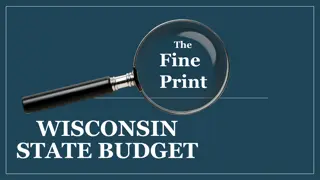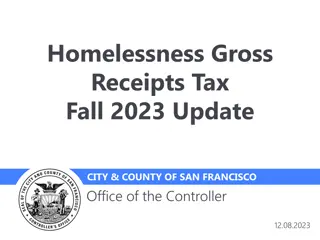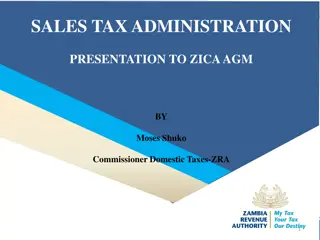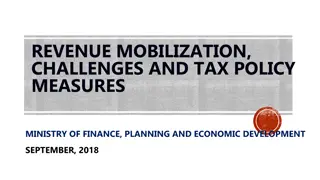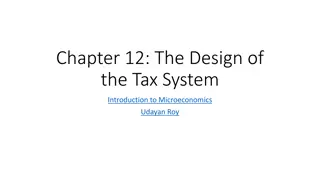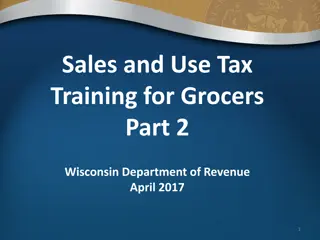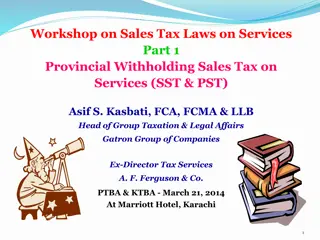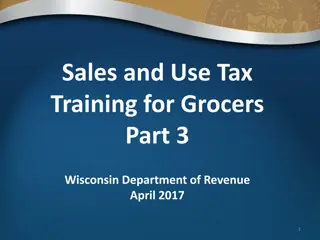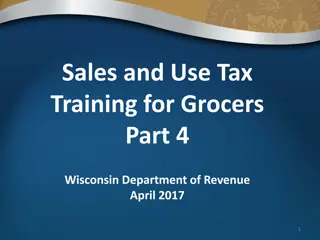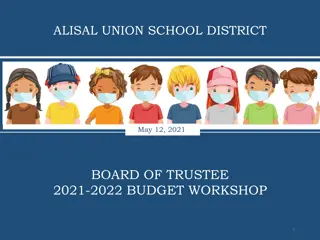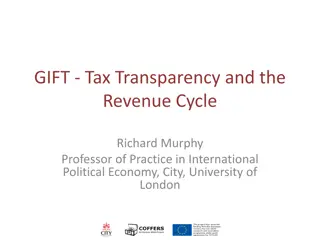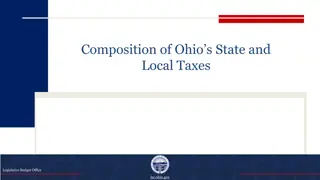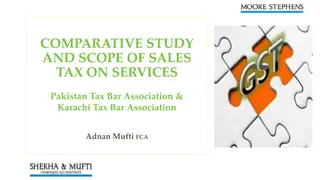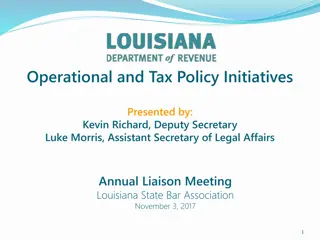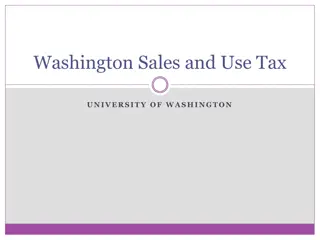Sales and Use Tax Training for Grocers - Wisconsin Department of Revenue
This material provides essential training and resources on sales and use tax for grocers in Wisconsin. Topics covered include sales by grocers, additional training on specific products, relevant tax sections, and exemptions applicable to food items sold in grocery stores. Non-food items subject to sales tax are also discussed, giving a comprehensive overview of tax regulations impacting grocers in the state.
Download Presentation

Please find below an Image/Link to download the presentation.
The content on the website is provided AS IS for your information and personal use only. It may not be sold, licensed, or shared on other websites without obtaining consent from the author.If you encounter any issues during the download, it is possible that the publisher has removed the file from their server.
You are allowed to download the files provided on this website for personal or commercial use, subject to the condition that they are used lawfully. All files are the property of their respective owners.
The content on the website is provided AS IS for your information and personal use only. It may not be sold, licensed, or shared on other websites without obtaining consent from the author.
E N D
Presentation Transcript
Sales and Use Tax Training for Grocers Part 1 Wisconsin Department of Revenue April 2017
Topics of Discussion Resources Sales by Grocers 2
Additional Training for Grocers Part 2 - Sales of Candy, Soft Drinks, and Dietary Supplements Part 3 - Sales of Prepared Foods Part 4 - Preparing for an Audit 3
Resources Website www.revenue.wi.gov Publication 220, Grocers Appendix I Prepared Food Flowchart Publication 223, Bakeries Publication 236, Restaurants and Bars Email Alerts: http://www.revenue.wi.gov/html/lists.html 4
Resources Section Tax 11.51, "Grocers' Guidelist" Section Tax 11.08, "Durable Medical Equipment, Mobility-Enhancing Equipment, and Prosthetic Devices" Section Tax 11.09, "Drugs" Section Tax 11.87, "Prepared Food, Food and Food Ingredients, and Soft Drinks" 5
Wisconsin Sales and Use Tax Sales, licenses, leases, and rentals of tangible personal property, certain coins and stamps, certain property affixed to real property, certain digital goods, and certain services are subject to Wisconsin sales tax, unless an exemption applies. 7
Wisconsin Sales and Use Tax Most items in a grocery store or convenience store are tangible personal property However, an exemption applies to many of the food items 8
Non-food Items Examples of non-food items subject to sales tax School supplies Toys Paper and plastic products Household and cleaning supplies Over-the-counter medication Automotive products 9
Non-food Items Examples of non-food items subject to sales tax Flowers, plants, and floral arrangements Photographs Photocopies Video rentals Carpet cleaning machine rentals Cigarettes and tobacco products 10
Exemption for Food and Food Ingredients The sales price from the sale of and the storage, use, or other consumption of food and food ingredients, except: Candy (see Part 2) Soft drinks (see Part 2) Dietary supplements (see Part 2) Prepared food (see Part 3) 11
Food and Food Ingredient A substance in liquid, concentrated, solid, frozen, dried, or dehydrated form, that is sold for ingestion, or for chewing, by humans and that is ingested or chewed for its taste or nutritional value does not include alcoholic beverages or tobacco. 12
Food and Food Ingredient Food and food ingredients include beverages, but not alcoholic beverages (0.5% or more alcohol by volume). Alcoholic beverages are taxable. 13
Examples of Exempt Food and Food Ingredients Crackers Apples Cheese Unsweetened bottled water Noodles Bread Milk 14
Examples of Items that are Not Food and Food Ingredients Cough drops Gum Aspirin Pet food Note: Sales of these items are taxable. 15
Miscellaneous Exemptions Fuel for motor vehicles subject to excise tax under Chapter 78, Wis. Stats. Prescription drugs Newspapers United States and Wisconsin flags 16
Exemption For Durable Medical Equipment Must be for use in a person's home Includes repair parts, replacement parts, and accessories for equipment that is: Primarily and customarily used for a medical purpose related to a person; Can withstand repeated use; Not generally useful to a person who is not ill or injured; and Not placed in or worn on the body Examples include vaporizers, heating pads, blood glucose monitoring machines, thermometers 17
"Use in a Person's Home" Means that the equipment is sold to an individual for use where they are living, regardless of whether the individual resides in a single family home, apartment building, nursing home, assisted living center, convalescent home, or school dormitory. 18
"Use in a Person's Home Durable medical equipment is not for use in a person's home if purchased by hospital, clinic, nursing home, assisted living center, convalescent home, dental office, chiropractor, or optician's office. This is the case even if the equipment is purchased for use by the residents of the nursing home, assisted living center, or convalescent home. 19
Exemption For Mobility-Enhancing Equipment Includes repair parts, replacement parts, and accessories for equipment that is: Primarily and customarily used to provide or increase the ability of a person to move from one place to another; May be used in a home or motor vehicle; and Generally not used by a person who has normal mobility Examples include canes, crutches, walkers, wheelchairs 20
Exemption For Prosthetic Devices Placed in or worn on the body to: artificially replace a missing portion of the body; prevent or correct a physical deformity or malfunction; or support a weak or deformed portion of the body Examples include arm slings, burn garments, arch supports, braces (wrist, ankle, knee, etc.), hearing aids and batteries, insulin pumps, pressure garments, splints 21
Additional Training for Grocers Part 2 - Sales of Candy, Soft Drinks, and Dietary Supplements Part 3 - Sales of Prepared Foods Part 4 - Preparing for an Audit 22
Contact DOR if you have questions WISCONSIN DEPARTMENT OF REVENUE Customer Service Bureau PO Box 8949, MS 5-77 Madison, WI 53708-8949 Phone: (608) 266-2776 Email: DORSalesandUse@wisconsin.gov 23
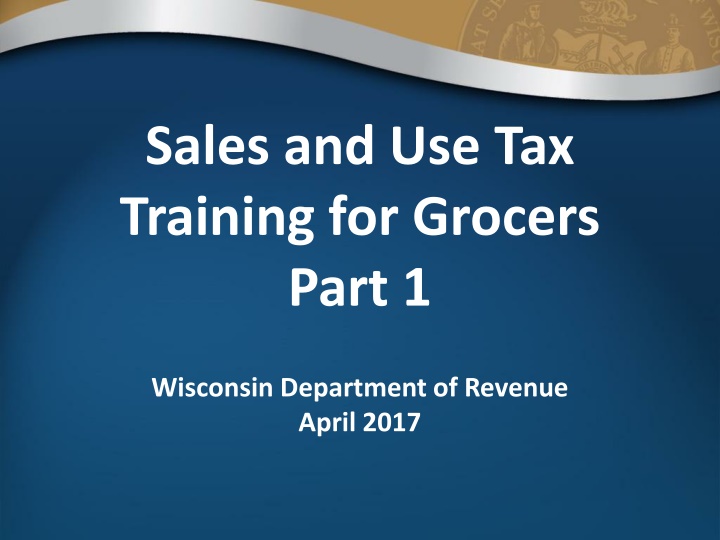

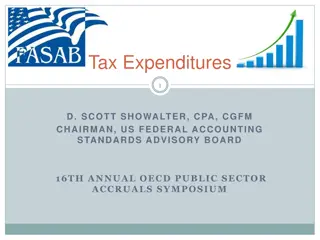
![Town of [Town Name] Real Estate Tax Rates and FY 2024 Budget Summary](/thumb/62211/town-of-town-name-real-estate-tax-rates-and-fy-2024-budget-summary.jpg)
